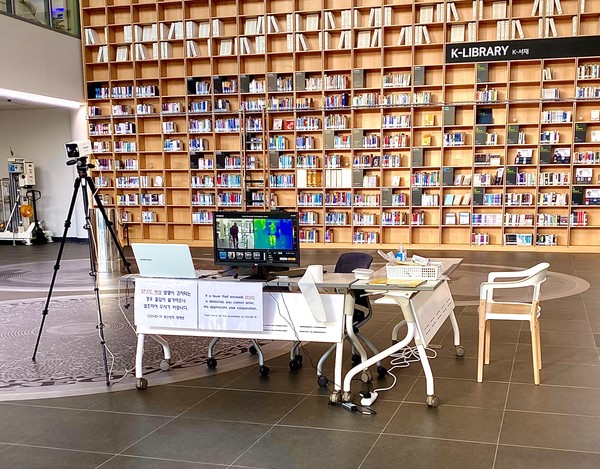The spring semester in KAIST has started in a profoundly different way to last year. The novel coronavirus epidemic rapidly evolved into a national emergency and a world pandemic, prompting KAIST administration and the Task Force for the Prevention of COVID-19, which was quickly established to respond to the volatile situations, to enact and update measures to protect KAISTians from the virus outbreak. Quarantine and self-monitoring guidelines have been set up, online classes have been introduced, and so-called social distancing measures have been implemented.

Quarantine and Self-Monitoring Requirements
On February 2, to cope with the pervading fear of the massive outbreak in China, KAIST announced that two buildings of Hwaam Hall would be used to quarantine students returning from China for a period of two weeks. School staff delivered meals and separate vehicles were utilized for transportation. Students residing in Hwaam who desired to move out were promptly transferred.
When the coronavirus caseloads spiked in Korea, with Daegu as the epicenter, KAIST introduced tighter policies regarding self-monitoring. Anyone who had visited or traveled via regions with high levels of coronavirus outbreaks, including Hong Kong, Macao, Singapore, Taiwan, Japan, Vietnam, Thailand, Malaysia, and the Special Care Zones in Korea (Daegu and Cheongdo) were required from February 21 to conduct close self-monitoring in their dorms, minimize social interactions, and report their body temperatures to the Task Force for 14 days.
This guideline was updated once again on March 16. Travel alert regions were expanded to China, Hong Kong, Macao, Japan, Iran, the U.S., and all of Europe. Employees who have visited those regions are required to report to the Task Force and work from home under self-quarantine. International students returning from the aforementioned regions to stay in KAIST are subject to self-isolation in Hwaam or self-monitoring in their dorms.
Change in Academic Schedule and Online Education
On February 16, KAIST announced that the spring semester would be postponed by two weeks, to begin on March 16, because it was deemed unsafe for students to return. As the epidemic showed no sign of subsiding, it was decided that online courses will replace traditional in-person classes for at least two weeks following the delayed start. Subsequently, an urgent announcement on March 13 declared that the period of online education would be extended indefinitely until further notice and that the resumption of in-person classes will be notified at least two weeks in advance. All undergraduates, except those who have an essential reason to stay, will be required to move out of the dormitories by March 23.
KAIST has been employing various countermeasures to reduce damage caused by the sudden changes, as many students voiced frustration about the school’s unilateral decisions. To prevent the altered schedule from obstructing students’ summer plans, KAIST is offering flexible operation of courses. Professors can decide whether to pursue the formal schedule and conduct the final exam on week 16 or to give the exam earlier during week 14 or 15 to accommodate students’ schedules. In the latter case, classes will either continue after the exam, or supplementary classes will be held beforehand to fulfill the 16 weeks’ worth of classes.
Social Distancing Measures
As a part of social distancing measures, many public spaces have been closed. Since March 5, the Main Library (E9) and Munji Campus Library have reduced their operating hours to 9 a.m. — 6 p.m. on weekdays, and all group study rooms have been closed. The Undergraduate Branch Library (N10) is also being shut down until further notice, effective March 23. In addition, all sports facilities, including the Lyu Keun-Chul Sports Complex (N3), tennis courts, and fields, are unavailable for use. Using the Chang Young Shin Student Center (N13-1) facilities will also be limited, including Mirae Hall and Ullim Hall, private practicing rooms, and the book cafe.
Large events have been canceled to minimize the risk of transmission. The matriculation ceremony and orientation for freshmen were canceled, and the degree conferment ceremony for graduates was substituted with individual delivery of the degrees. Amid unsettling news of the skyrocketing number of confirmed cases, the Undergraduate Club Union distributed tightened guidelines for club activities. It strongly advises not to use the group rooms and to avoid holding events involving more than five people unless absolutely necessary, in which case clubs must report the meeting and perform specified health measures.
The KAIST Task Force has installed several thermography cameras in buildings with high student traffic, including the cafeterias (North, East, West, and Munji), the Main Library (E9), KAIST Childcare Center (W2-1), and the Main Administration Building (E14). Effective March 6, anyone with a body temperature above 37.5 degrees Celsius will be prohibited from entering the building. Entrances without thermal cameras will be closed and outside visitors are banned from entering school buildings.
The issues facing KAIST echo the challenges facing other universities in Korea, as they are pursuing unprecedented steps to cope with COVID-19. While this semester holds many uncertainties, KAIST promises to put KAISTians’ health and safety in the first priority and asks for their understanding and cooperation in this difficult time.

